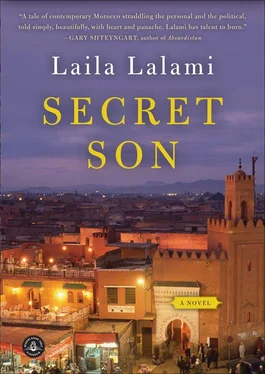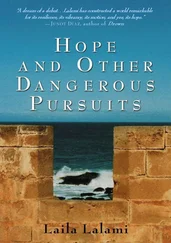“I’m not going anywhere,” he said, rubbing his beard.
She watered her potted flowers, started the kettle, turned on the radio. When the tea was ready, she reappeared at the door of the bedroom. “Why don’t you come eat your breakfast in the yard?”
The delicious smell of mint and sugar drifted in with her. Still, he replied, “It’s too hot out there, a-mmi.”
She ate alone without complaint and later brought him a glass of tea and a plateful of fritters. “Why don’t you invite Amin to come over?” she asked.
He shook his head. “I don’t feel like seeing anyone.”
As she was getting ready for work the next day, she told him she would no longer serve meals in the bedroom. “If you want to eat, you will have to get out of bed.” He looked at her in despair. Could she not see that he was unwell? He turned to his side and faced the wall, picking at the paint with his fingernail until he heard her leave. When she came home that night, she did as she had promised. It was the same the next day, and the day after that, until hunger drove him to the yard, where he made himself a pot of tea on the Butagaz and ate a piece of bread from the basket under the awning.
In the morning, she shook him awake. “Here,” she said, handing him a fifty-dirham bill. “I need you to get some sugar and some oil today.”
“I can’t,” he said.
“Why not?”
“I don’t want to go out.”
“I don’t want to go to work, either, but here I am,” she said, putting a blue jellaba over her uniform and zipping it up. From the armoire, she fetched her purse and checked for her keys.
“People will ask me questions. They’ll want to know what happened.”
“Then tell them.” She snapped her purse shut.
“I can’t.”
“Then don’t tell them. Look, you’re not going to stay locked up in here the rest of your life.”
Why not? Youssef thought. Here, he was safe.
“I have two shifts to do today,” she continued, “because Jamila is sick and can’t come to work. So I won’t be back till after nine o’clock. Get me one liter of oil and half a kilo of sugar.”
“Please, a-mmi,” he pleaded.
She ignored him, slipped her shoes on, and left. Wrapping himself up in his blanket, he went to the yard, where he turned on the TV. Though he watched the show, his mind was elsewhere. The errand seemed insurmountable, but the thought occurred to him suddenly that it might be possible to do it without being seen. After all, it was only seven thirty in the morning.
He cast the blanket aside and hurriedly put on his shoes. The street was quiet as he walked toward Moha’s hanout, on the other side of the hill. Before Youssef had moved out of the neighborhood, he had rarely gone to Moha’s, so when he appeared in the store today, no one asked him where he had been. He paid for the sugar and the oil, picked up the plastic bag, and left. He was already congratulating himself on having gone and come back unseen, when, turning a corner, he glimpsed Amin with two street urchins. His heart sank.
“Bellati!” Amin yelled. “A-Youssef, wait!”
Youssef walked faster, keeping his eyes locked on the ground.
Amin and his friends crossed the street. “Can’t you hear me calling?”
“Ah, Amin, my brother,” Youssef said, trying to do his best impression of his old self. “Forgive me, I wasn’t paying attention.” Amin wore a jean jacket streaked with dirt around the collar and sleeves. His eyes had that vacant stare they sometimes had when he smoked hashish. Youssef did not recognize the two teenagers standing by his side; maybe they were fresh additions to Hay An Najat from the countryside.
“What are you, deaf?” Amin said, looking at his two friends, who laughed as though he had just told the best joke in the world. “What’s this?” he asked, pointing to the plastic bag.
“This? Just some sugar and oil.”
“You’re running errands for your mother,” Amin said, “like a good little boy.” And he laughed again.
Youssef shrugged and walked away. Amin followed. “Where have you been?”
“Around.”
“What’s that supposed to mean?”
“Around.”
“Leave us,” Amin told his friends.
The house was less than a block and a half away now.
“Your father kicked you out,” Amin said.
“No.”
“You think that just because I live here, I’m stupid?”
“I didn’t say you were.”
Another thirty meters to go.
“What are you doing here, then?”
“Buying sugar.”
“It’s a long way to come for sugar. He threw you out, didn’the?”
Youssef didn’t answer. He felt his anger sharpen inside him again, taking the form of a blade, ready to strike at his friend.
Ten more meters.
“He threw you out,” Amin said. “I told you those people aren’t like us. I told you. But no, you had to go on pretending you were someone you’re not.” He was close enough that Youssef could smell cigarettes and hashish on his breath. “I told you!”
“Fine, you told me, O Professor,” Youssef said, shooting him a dark look. “Bezza’t. Get over yourself.”
Five meters.
Amin stopped abruptly. “I should have known better,” he yelled, “than to befriend a son of a whore.”
THE WORDS TORTURED Youssef all day. When his mother came home from work, he told her he had a migraine and felt dizzy and nauseous whenever he stood up. He gave her such a look of distress that she did not bother him further. But the next day, she brought him painkillers from the hospital and stood over him as he swallowed the recommended dosage. “Now, why don’t you go out to stretch your legs?” she suggested.
“I don’t feel like going out, a-mmi.”
“You don’t want to go out and see your friends?”
These were words he never thought he would hear from her. Although he savored the irony, he also wondered how much longer he could avoid seeing Amin. The man was probably parading around the neighborhood with his new sidekicks, telling everyone how his joke had sent Youssef running home — what an intolerable thought.
That afternoon, just before dusk, Youssef went to the Oasis. The Party’s building looked better than it had the last time he had been there. Huge flags with the motto THROUGH GOD. WITH GOD. BY GOD hung from the main door, lights outlined the facade, and all the windows were open to let in the cool evening air. Youssef could see young men clustered around the tables in the café. Maati stood guard at the entrance. When he saw Youssef walk up, an expression of shock lit his face. He opened his arms wide. “Long live he who sees you, my brother,” he said. “Where have you been?”
Youssef stuck to the story his mother had told the neighbors: a cousin of hers had helped him find a job at a hotel in Marrakech, but now he had been let go. He was grateful for the hug Maati gave him, for the gruff pats on the back that made him feel that things could still be the way they used to be. He scoured the café, looking for familiar faces: Simo was playing chess with Rachid; Mounir was doing a crossword puzzle; Rachid’s brother was watching a football match; Hatim was reading the paper, holding it with one hand, while with the other he fingered his green prayer beads. And there, at a corner table, was Amin, with his new friends.
“Go in, go in,” Maati said. “Order some tea or coffee. I’ll look for someone to cover for me and I’ll come join you.”
Youssef asked for two glasses of tea at the counter, carrying them to a table at the other end of the café. Before he could sit down, though, Amin cried out, “Look who came here today. He thinks he can come and go as he pleases, like he owns the place, like he’s better than us.”
Читать дальше












